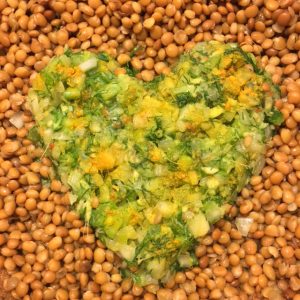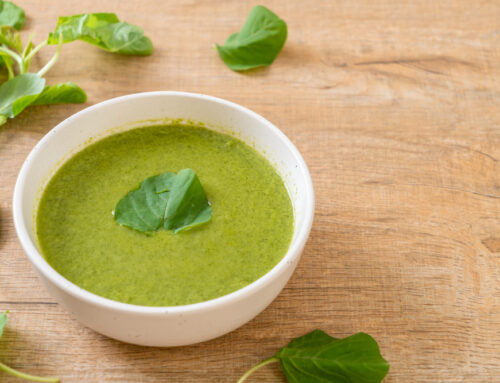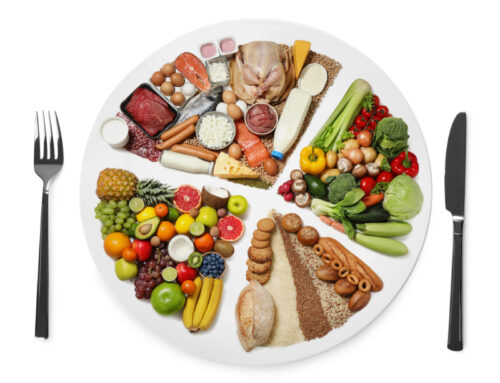‘Prevention is definitely the best medicine when it comes to heart health’.
By Dr. Kathleen Regan, ND
Healthy hearts are predicted by:
- Normal blood pressure (~120/80mmHG),
- Balanced lipid profile (Low Total Cholesterol, Low LDL, High HDL, Cholesterol Ratio)
- Body mass index between ~18 and 24.
Cardiovascular problems such as hypertension, high cholesterol, and obesity are caused by a perfect storm of poor nutrition, high inflammation, and poor immune function. Much of this can be avoided or even remedied with diet and lifestyle, especially when incorporating heart-healthy superfoods into your daily meals.
Balanced consumption of carbohydrates, protein, and fat feeds a hungry heart, fights inflammation, and balances the immune system. Specific vitamins and minerals are required daily for the heart to function, and most of these can be found in food. But what do these ‘heart-friendly’ foods do to protect our hearts? Whether you are in wellness mode or struggling with cardiovascular issues, understanding how your foods work will help you make the right choices.
Top Heart-Healthy Foods to Include in Your Diet
In addition to a balanced intake of carbohydrates, protein, and healthy fats, certain foods stand out for their ability to support cardiovascular wellness. These heart-healthy foods are rich in fibre, antioxidants, and essential nutrients that may help lower blood pressure, manage cholesterol, reduce inflammation, and promote overall heart function. Here’s how to organise your plate for better heart health:
Fruits, Vegetables and Sea Vegetables
- Berries (e.g., blueberries, strawberries) – Packed with antioxidants and fibre; may help lower blood pressure and reduce inflammation.
- Leafy greens (e.g., spinach, kale) – Rich in potassium and nitrates; support healthy circulation and relaxed blood vessels.
- Sea vegetables (e.g., nori, kelp) – High in iodine, fibre, and unique antioxidants that support vascular health.
- Aim for 6–8 servings daily, with at least 4–6 vegetables.
Whole Grains and Fibre-Rich Foods
- Legumes (beans, lentils, chickpeas) – High in fibre and plant-based protein; help regulate blood sugar and improve cardiovascular health.
- Whole grains (e.g., oats, quinoa, brown rice) – Help lower LDL cholesterol and support digestive health.
- Aim for 25–40 grams of fibre per day from legumes, whole grains, fruits, and vegetables.
Healthy Fats
- Fatty fish (e.g., salmon, mackerel, trout, tuna) – Provide omega-3 fatty acids; help reduce triglycerides and inflammation.
- Olive oil – Rich in polyphenols and monounsaturated fats; helps lower blood pressure and oxidative stress.
- Avocados, seeds, nuts – Contain monounsaturated and polyunsaturated fats that reduce LDL cholesterol.
- Include these fats regularly to support heart function and metabolic health.
Nuts and Seeds
- Walnuts & almonds – Offer healthy fats and antioxidants; reduce LDL cholesterol and inflammation.
- Peanuts, pistachios, pecans & macadamias – Also shown to lower bad cholesterol and improve endothelial function.
- A handful of unsalted nuts daily can contribute significantly to heart health.
Beverages and Natural Additions
- Green tea – Rich in flavonoids and catechins; supports metabolic health and reduces oxidative stress. Aim for 2–3 cups per day.
- Garlic – Shown to lower blood pressure and cholesterol; supports vascular health. Incorporate into meals regularly.
- Dark chocolate (70% cocoa or more) – Contains flavanols that enhance nitric oxide production and support vascular function; enjoy in moderation.
Protein Sources
- Lean meats, poultry, fish, legumes, dairy – Help stabilise blood sugar and maintain muscle mass.
- Protein should make up about 10–35% of daily calories for optimal cardiovascular balance.
- Whole soy foods (tofu, tempeh) – Soy protein has been shown to lower serum LDL cholesterol.
- Plant sterols & stanols – Naturally reduce cholesterol absorption; aim for 1.5–3 g daily through fortified foods or supplements.
Foods to Limit
- Added sugars – Can lead to insulin resistance, weight gain, and elevated triglyceride levels.
- Limit added sugars to under 25g/day for women and 35g/day for men.
Supplements and Fortified Options
- Omega-3 supplements (e.g., fish-oil) – If dietary fish is limited, 1,000 mg/day helps ensure anti-inflammatory benefits.
- Minerals & Fat-Soluble Vitamins
- Magnesium & calcium – Work together to regulate blood pressure; low magnesium is linked to higher CVD risk.
- Vitamin D & K – Support arterial health and calcium balance.
- Vitamin E & A, selenium – Act as antioxidants and protect vascular tissue.
By grouping foods by type and focusing on their distinct cardiovascular benefits, you can build meals that actively support heart health while maintaining variety and flavour.
Simple Ways to Add Heart-Healthy Superfoods to Your Meals
Incorporating heart-healthy superfoods into your everyday meals doesn’t have to be complicated. Here are some simple, actionable ideas to get started:
- Start your morning with oatmeal topped with blueberries, chia seeds, and a splash of plant-based milk.
- Snack on nuts and seeds like almonds, walnuts, or flaxseed for a heart-supportive boost.
- Add leafy greens like spinach or kale to smoothies, stir-fries, and soups.
- Swap out saturated fats with olive oil when cooking or making salad dressings.
- Choose fatty fish like salmon or trout a few times a week instead of red meat.
- Brew green tea as an afternoon beverage rich in cardioprotective antioxidants.
- Use garlic and herbs for flavour instead of salt to help manage sodium intake.
- Incorporate beans and legumes into salads, stews, and grain bowls for extra fibre and protein.
These small steps can collectively make a big difference in your cardiovascular well-being and support a disease prevention approach.
The above provides a basic roadmap for cardiovascular health. I often get people to start tracking their carb, protein, fat, fibre, and sugar intake on a phone app, myfitnesspal.com, to raise awareness over their healthy, whole food consumption. Combined with exercise, these foods can help to promote a healthy & happy heart. Of course, there are many supplements and herbs that help fight hypertension, high cholesterol, and obesity, but these are best recommended under the care of a naturopathic doctor who will review your diet, lifestyle, medical history, and medication to provide the best treatment plan possible.
Supporting Your Heart Health Through Naturopathic Medicine
At Innate Wellness, we take a whole-body approach to heart health. If you’re managing cholesterol, blood pressure, or simply want to prioritise prevention, Naturopathic Medicine offers personalised support. By considering lifestyle, nutrient status, and stress management, our practitioners work with you to create realistic, sustainable plans that fit your life.
Looking to personalise your approach to heart-healthy superfoods and overall cardiovascular wellness? Contact us today to work with a naturopathic doctor who can guide you through diet, lifestyle, and supplement choices tailored to your unique heart health needs.






